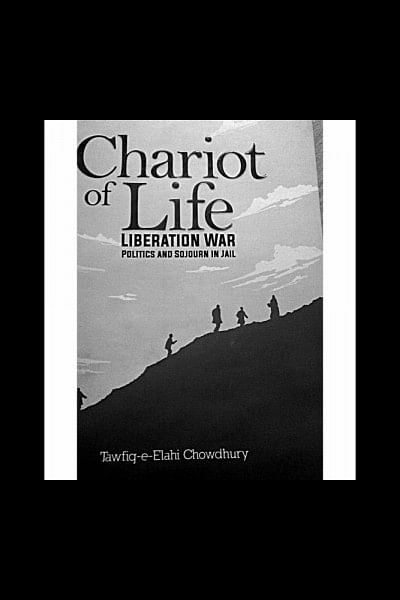A Review of His Chariot of Life: Liberation War, Politics and Sojourn in Jail

After Tawfiq-e-Elahi Chowdhury was slapped an uncertain prison term at the end of what he describes as a 'kangaroo trial,' on 18 April 2008, he must have felt like the hapless Joseph K (of Kafka's The Trial) – confused, agitated and resigned, having no clue why he had been picked up and put in the dock on charges that a proper court of law would find it difficult to entertain. What he found particularly humiliating was the way he was summoned and interrogated by peoplewho didn't even care to show him the respect he deserved as a decorated freedom fighter and a dedicated public official of high standing. He had to suffer the ignominy of seeing his integrity being questioned, but he realized soon enough that the long process of interrogation was meant to disorient and break him. So he stood his ground, and faced the trial with courage and conviction. Tawfiq-e-Elahi also tells us how he saw the ordeal as a test of faith which he resolved to win. Still, as he writes in Chariot of Life: Liberation War, Politics and Sojourn in Jail (Dhaka, Shrabon, 2018), it was not easy to make sense of the confusing trial which was clearly meant to be a part of the 'minus two formula' of the military led caretaker government which came to power through a coup in November 2006. Incidentally, the present Prime Minister, Sheikh Hasina, the principal accused and one of the two leaders the caretaker government tried to minus off, sat next to him during much of the trial and Tawfiq-e-Elahi describes with pride how she consoled him and even shared jokes to make light of the proceedings.
Tawfiq-e-Elahi's imprisonment in Dhaka central jail was marked by an initial sense of disorientation and despair, as loss of freedom hurt him deeply. But he soon adjusted to the rigour of jail life, as his survival instinct took over. As he wrote in a letter on 11 September 2008 to Dr. S.A. Samad, a retired Secretary of the government who was a co- accused in the case but who escaped the trial as he was living abroad: "Incarceration is a traumatic experience; but once you are in it, a whole new world unfolds and it is up to you to make the most out of it." He indeed decided to make the most of his time inside the jail. He learnt to follow the daily routine, eat the gross food served to him, sleep in cramped conditions and even do a bit of exercise to keep him fit. The confinement was not solitary, so he could strike up conversations with cell mates. He was given a 'faltu' – a younger fellow prisoner—to look after him and do his errands. He got used to the regular trips to the court in a crowded prison van and even looked forward to his short term return to the world outside. And most importantly, he began to keep an account of his prison days and reminisce about the events of 1971. In the years following his release Tawfiq-e-Elahi added his reminiscences of the liberation war to his prison diary in the form of a series of narratives. The result is the book, Chariot of Life, which weaves together the fascinating accounts of the war and those of his prison days. The two tales—one national, the other personal— although their time frames are 37 years apart, have the same themes: incarceration and freedom. In 1971, the whole of Bangladesh was a prison, and the war of liberation was waged to end this incarceration. In 2008, Tawfiq-e-Elahiwas imprisoned on a made up charge, and he won freedom through patience, faith and a gritty legal battle which had the support of his countrymen.
I was one of the few early readers of the manuscript of Tawfiq-e-Elahi Chowdhury's prison diary which he sent me with a request to see how it read. It was a slim volume of nearly a hundred and fifty A4 size pages which dealt mostly with his days inside the jail and his fight for freedom. As I read the account of his journey from a peaceful and happy retired life to a life behind bars, I was overtaken by a sense of outrage. It pains me to see one's rights being trampled and one's dignity being taken away, wherever these happen, no matter which government is in power. The rule of the caretaker government has been marked by flagrant abuse of power and violations of human rights. If the army takeover was justified as a much needed move to restore law and order following the mayhem in the last few months of the BNP government and strengthen the democratic polity –what followed in the next two years did very little to support it.
One reason I found the diary a captivating read was the way Tawfiq-e-Elahikept his head high throughout the series of interrogations and the trial. That was something that I expected from him as a freedom fighter. I have known him for a long time and respect him forhis service to the nation during and after 1971. When he was the Sub-Divisional Officer of Meherpur in 1971, he was one of the first officials to initiate resistance against the enemy. On 26 March, hours after the Pakistanis had launched their Operation Searchlight and before any organized resistance had started, he wrote in his official pad a one line appeal to the 'Indian Brethren': "Please help us with arms." Then in May, amid bombardment and strafing by Pakistani fighter jets, he helped transport nearly four and half crore rupees (about US$ 10 million at the time) and more than 20 kgs of gold ornament from different banks and the treasury to Calcutta to be deposited with the Bangladesh government. The money kept the government afloat for quite some time. After the war, we heard this and other stories of Tawfiq-e-Elahi's courage and honesty which became a part of the collective history of bravery and resistance of our freedom fighters.
When I received a copy of Chariot of Life I was intrigued by the title. No, not by the metaphor of chariot (one doesn't usually associate it with life) but by the two bold words of the subtitle in black placed just under the title: liberation war. I tried to recall if his prison diary had any section on the war. It did indeed mention the war, but not at great length. But my reading of the book soon revealed why the liberation war was given such prominence. It was Tawfiq-e-Elahi's journey back to time, to the defining moment of our long history and a source of our collective strength. Clearly, during the seven months of his imprisonment, he was falling back to the memory of those heroic times to give him strength. I also felt that his pride as a freedom fighter helped him forget the deplorable turn of events that were far removed from what he fought for in 1971.
Chariot alternates between accounts of Tawfiq-e-Elahi's detention and those of the war. By any reckoning, these are completely different stories except for the fact that the person telling them is the same. But the transition from one to the other is never jarring or forced— the reader rather welcomes the transition as a release from the oppressive present to a reassuring past. In spite of the Kafkaesque nature of his ordeal, Tawfiq-e-Elahi doesn't allow his narrative of imprisonment to lose objectivity, since he was also writing a bit of history which shares many common elements with those written by others who had similar experiences during the caretaker years.
After reading Chariot, one part of which reads like a chronicle of our war of liberation, I feel encouraged to request Tawfiq-e-Elahi Chowdhury to write an enlarged and more detailed version of it in English, beginning with the rise of Bengali nationalism in the wake of the cultural, political and economic repression in the 1960s and ending with the surrender of the Pakistani forces. There are two compelling reasons why he should write the book: his firsthand experience of the war both as a participant and organizer, and the sheer bulk of work written by others – Indian and Pakistani military officers, researchers and journalists—which take the limelight away for Bangladeshi freedom fighters. The Pakistani accounts often present a counter narrative that distorts history and absolves their military from any wrongdoing. These books are, unfortunately, used for reference in research on 1971 in many universities in South Asia and beyond. We have truth on our side; all we need to do is to present it in narratives that freedom fighters like Tawfiq-e-Elahi Chowdhury are the most qualified to write. I urge the younger reader, especially those born after 1971, to buy a copy of the book because both the histories described in this book are important for you to know.

 For all latest news, follow The Daily Star's Google News channel.
For all latest news, follow The Daily Star's Google News channel. 



Comments